Channel 4’s Dirty Business shows why private companies cannot be trusted with vital services like water, says PAUL DONOVAN

 Alex Salmond speaks at the SNP conference in Glasgow, October 14, 2016
Alex Salmond speaks at the SNP conference in Glasgow, October 14, 2016
DURING his two periods as SNP leader, from 1990 to 2000 and from 2004 to 2014, Alex Salmond transformed Scottish and, thereby, British politics. In doing so, he helped ensure that Britain’s character as a multinational state could no longer be ignored.
What led to this transformation? Salmond was a forceful and charismatic speaker. He could read his audiences — whether trade unionists or bankers. But it was his politics that were key. They transformed the SNP.
In the 1930s, the SNP had been a right-wing, and sometimes very right-wing, party representing a mixture of romantics, eccentric aristocrats and minority elements within what used to be called the petty bourgeoisie — but it was squeezed to virtual non-existence between a dominant Unionist Party, that harvested a significant Orange vote, and a challenging and relatively radical Labour Party.

On the release of her memoir that reveals everything except politics, Sturgeon’s endless media coverage has focused on her panic attacks, sexuality and personal tragedies while ignoring her government’s many failures, writes PAULINE BRYAN

VINCE MILLS cautions over the perils and pitfalls of ‘a new left party’












